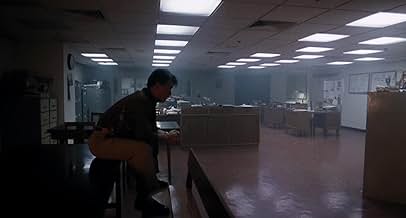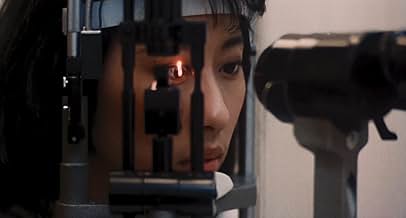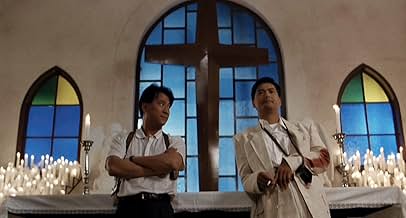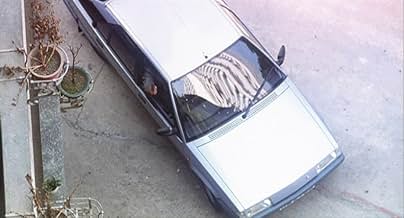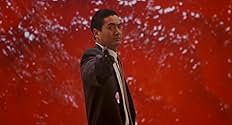CALIFICACIÓN DE IMDb
7.7/10
53 k
TU CALIFICACIÓN
Un asesino desilusionado acepta un último golpe con la esperanza de utilizar sus ganancias para devolver la visión a una cantante a la que dejó ciega por accidente.Un asesino desilusionado acepta un último golpe con la esperanza de utilizar sus ganancias para devolver la visión a una cantante a la que dejó ciega por accidente.Un asesino desilusionado acepta un último golpe con la esperanza de utilizar sus ganancias para devolver la visión a una cantante a la que dejó ciega por accidente.
- Premios
- 2 premios ganados y 6 nominaciones en total
Chow Yun-Fat
- Ah Jong
- (as Chow Yun Fat)
Kong Chu
- Sydney Fung
- (as Chu Kong)
- …
Kenneth Tsang
- Sgt. Tsang Yeh
- (as Tsang Kong)
- …
Shing Fui-On
- Wong Hoi
- (as Shing Fui On)
Ricky Chun-Tong Wong
- Frankie Fung
- (as Fan Wei Yee)
Chuen Chiang
- Shooter at beach
- (sin créditos)
Chin-Hung Fan
- Shooter at beach
- (sin créditos)
Woon-Ling Hau
- Trash lady
- (sin créditos)
- Dirección
- Guionista
- Todo el elenco y el equipo
- Producción, taquilla y más en IMDbPro
Opiniones destacadas
John Woo's "The Killer" shows a master at the height of his powers. Woo, today working in the United States, gained fame in Hong Kong through the two "Better Tomorrow" films. He became popular and used his success to go to greater things. In fact, much of Woo's HK work is similar, including the work he did in the early 90's like "Bullet in the Head" and "Hard Boiled". But "The Killer" shows John Woo as a perfectionist, the top director of action films who can perfectly blend in over-the-top violence with emotional drama.
"The Killer" follows John (Jeff in other versions of the film), who's played to utter perfection by Chow Yun Fat. John is a hit-man planning retirement. On one job, however, he accidentally shoots a singer (Jenny) near her eyes. She survives, but her vision is blurry. John saves her from a gang of rapist thieves, and the two ultimately fall in love with each other, despite Jenny never having seen John's face. On John's case, however, is Inspector Li, hard at work, who is intent on always getting his man. Much of the movie involves John and the results of his final job which ultimately pits him up against the entire mob, who want him dead for overexposing his identity. And the rest of the film follows John catering to Jenny's needs and helping her at every moment, all the while evading Li, who's getting closer and closer to stopping him.
To make the movie the memorable film that it is, Woo perfectly orchestrates some of the best shoot-outs ever seen on film. Much of what Woo did here, he was never able to follow up. "Hard Boiled" was interesting, but its final shoot-out, over 20 minutes in length, just couldn't keep up. It got boring by the end. What Woo does in "The Killer" is give you a sample of his powers and then leave you begging for more. And that what you'll be literally doing: begging for just a glimpse of the next dude victim to Fat's two beautiful handguns.
It's only sad to see that, not so much Woo doesn't do these films anymore, but that Woo rarely does good films now.(Period) He's too busy, working on ego with top stars and killer budgets. His two films that came as far as making an impact with me from his U.S. catalog will probably include "Broken Arrow" and "Face/Off", both primarily due to just how much I like Travolta (though the former was also an early film of mine that I really remember liking, since it was different from all the Disney and kid stuff I was used to). But Woo, intent on fulfilling his dreams of making a musical and captivating audiences with his powerful style, can just show the people a screening of this film. It's quoted as being "Violence as poetry", and that's exactly what it is. With the beautiful music adding feeling and depth to the characters and the great writing and direction, this is easily Woo's tour-de-force.
9.5/10 (****/****)
"The Killer" follows John (Jeff in other versions of the film), who's played to utter perfection by Chow Yun Fat. John is a hit-man planning retirement. On one job, however, he accidentally shoots a singer (Jenny) near her eyes. She survives, but her vision is blurry. John saves her from a gang of rapist thieves, and the two ultimately fall in love with each other, despite Jenny never having seen John's face. On John's case, however, is Inspector Li, hard at work, who is intent on always getting his man. Much of the movie involves John and the results of his final job which ultimately pits him up against the entire mob, who want him dead for overexposing his identity. And the rest of the film follows John catering to Jenny's needs and helping her at every moment, all the while evading Li, who's getting closer and closer to stopping him.
To make the movie the memorable film that it is, Woo perfectly orchestrates some of the best shoot-outs ever seen on film. Much of what Woo did here, he was never able to follow up. "Hard Boiled" was interesting, but its final shoot-out, over 20 minutes in length, just couldn't keep up. It got boring by the end. What Woo does in "The Killer" is give you a sample of his powers and then leave you begging for more. And that what you'll be literally doing: begging for just a glimpse of the next dude victim to Fat's two beautiful handguns.
It's only sad to see that, not so much Woo doesn't do these films anymore, but that Woo rarely does good films now.(Period) He's too busy, working on ego with top stars and killer budgets. His two films that came as far as making an impact with me from his U.S. catalog will probably include "Broken Arrow" and "Face/Off", both primarily due to just how much I like Travolta (though the former was also an early film of mine that I really remember liking, since it was different from all the Disney and kid stuff I was used to). But Woo, intent on fulfilling his dreams of making a musical and captivating audiences with his powerful style, can just show the people a screening of this film. It's quoted as being "Violence as poetry", and that's exactly what it is. With the beautiful music adding feeling and depth to the characters and the great writing and direction, this is easily Woo's tour-de-force.
9.5/10 (****/****)
10Spiku
First of all, I am disgusted by some of these reviews. Modern action has been overrun by special effects and stuntmen with death wishes (not that I'm complaining), but one must consider the time and the place. It's not the world of the Matrix or the Human-Cyborg War (or whatever it's called) in the Terminator, it's Hong Kong in the 1980's with counterfeiting, hostile Chinese syndicates. It doesn't have to be a big budget feature to be great. Clerks by Kevin Smith had a minute budget, but it made Smith famous.
I digress. Woo creates a sensitive and emotionally complex... assassin. To make him reconsider his job as a professional killing machine Jeffrey, the killer, blinds a lounge singer, Jenny. He swears to himself that he will end his career after one last job. Woo introduces us to the concept, like you see in A Better Tomorrow, that you can never leave a Triad even if you try your hardest. With an hour of attempting, Jeff realizes the horrible truth. Rarely does Woo bring in this feeling of absolute futility in his work. After losing his best friend, Jeff has crossed the Rubicon in his attempts and must end his ties to it by ending his everyone's but his own, excluding Jenny and Inspector Lee. Some people dislike the final shootout, but the doves and the Christian symbology adds a touch that drives religious and heroic bloodshed to the minds of the audience. On a personal note, I love it. The last few seconds depict a man, perhaps Lee, playing a harmonica in front of the church for reasons I don't know.
I digress. Woo creates a sensitive and emotionally complex... assassin. To make him reconsider his job as a professional killing machine Jeffrey, the killer, blinds a lounge singer, Jenny. He swears to himself that he will end his career after one last job. Woo introduces us to the concept, like you see in A Better Tomorrow, that you can never leave a Triad even if you try your hardest. With an hour of attempting, Jeff realizes the horrible truth. Rarely does Woo bring in this feeling of absolute futility in his work. After losing his best friend, Jeff has crossed the Rubicon in his attempts and must end his ties to it by ending his everyone's but his own, excluding Jenny and Inspector Lee. Some people dislike the final shootout, but the doves and the Christian symbology adds a touch that drives religious and heroic bloodshed to the minds of the audience. On a personal note, I love it. The last few seconds depict a man, perhaps Lee, playing a harmonica in front of the church for reasons I don't know.
Chow Yun Fat and John Woo teams up together with strong commitment to this highly melodramatic action film. The Killer was so ahead of its time especially with its signature shootout scenes and fast paced action sequences in its time of production in Hong-Kong. Without any special, visual or sound effects; it's a high achievement on both sound and vision. It's high on thematic values, but low on production values.
Woo benefited a lot from a team of action-coordinators as part of the production crew he assigned with. 20 years from its screen release, today still there are not many action films in which the sequences are coordinated as good as in The Killer. The rest of the production was standing by its plot, which becomes unbearable due to extremely melodramatic events. Woo tries to hurt our feelings as much as he can by killing and injuring innocents so ruthlessly: Passengers on a train, children on a beach, singers at a night club etc.
Lowell Lo's heart-wrenching theme and background music was one of the finest of the thematic values. Story development is also very effective that everything seems going fine at the beginning of Jong(the hit-man)'s last mission, then for he wasn't paid for his successful assassination he decides to show up back from underground with his alias: "Jeffrey". When he did, a stage singer ends up losing her sight and becomes blind from shot blasting. Jong helps her get well; she falls in love with him. He introduces himself as Jeffrey to her. No matter what romance they share together, no matter how close they are to each other; there is absolutely no accordance no chemistry between Sally Yeh and Chow Yun-Fat. Sally Yeh acts so poorly, especially while she keeps screaming needlessly every other scene.
For whoever likes this film, I strongly advise Léon to them. The same idea also works in Luc Besson's film, too: In a hit-man's life; there is no certain way to go, there is nobody to trust, there is no repentance. In Luc Besson's film of 1994, Jean Reno and Natalie Portman builds up a better harmony using emotions but not melodrama.
Additionally in John Woo's film, even though Chow Yun-Fat is not fast enough he just stands by the bullets by running, or guards himself with armchairs and seats of the cathedral which are vulnerable to bullets with the gaps between backrests. So many bullets are used... Were they shot by children or blind hitmans? How could you explain not getting shot while 4 hitmans are aiming at you running inside the cathedral and running on the beach? On the other hand, every single bullet that's used in Léon, hurts one person or another; or leaves marks, tracks and holes on walls, and in the texture of the floor. It's not an acquirement to waste 10 thousand bullets in a movie; but it's really an achievement when you configure a sub-production plan just to preview and review the bullets in both pre-production and production.
Woo benefited a lot from a team of action-coordinators as part of the production crew he assigned with. 20 years from its screen release, today still there are not many action films in which the sequences are coordinated as good as in The Killer. The rest of the production was standing by its plot, which becomes unbearable due to extremely melodramatic events. Woo tries to hurt our feelings as much as he can by killing and injuring innocents so ruthlessly: Passengers on a train, children on a beach, singers at a night club etc.
Lowell Lo's heart-wrenching theme and background music was one of the finest of the thematic values. Story development is also very effective that everything seems going fine at the beginning of Jong(the hit-man)'s last mission, then for he wasn't paid for his successful assassination he decides to show up back from underground with his alias: "Jeffrey". When he did, a stage singer ends up losing her sight and becomes blind from shot blasting. Jong helps her get well; she falls in love with him. He introduces himself as Jeffrey to her. No matter what romance they share together, no matter how close they are to each other; there is absolutely no accordance no chemistry between Sally Yeh and Chow Yun-Fat. Sally Yeh acts so poorly, especially while she keeps screaming needlessly every other scene.
For whoever likes this film, I strongly advise Léon to them. The same idea also works in Luc Besson's film, too: In a hit-man's life; there is no certain way to go, there is nobody to trust, there is no repentance. In Luc Besson's film of 1994, Jean Reno and Natalie Portman builds up a better harmony using emotions but not melodrama.
Additionally in John Woo's film, even though Chow Yun-Fat is not fast enough he just stands by the bullets by running, or guards himself with armchairs and seats of the cathedral which are vulnerable to bullets with the gaps between backrests. So many bullets are used... Were they shot by children or blind hitmans? How could you explain not getting shot while 4 hitmans are aiming at you running inside the cathedral and running on the beach? On the other hand, every single bullet that's used in Léon, hurts one person or another; or leaves marks, tracks and holes on walls, and in the texture of the floor. It's not an acquirement to waste 10 thousand bullets in a movie; but it's really an achievement when you configure a sub-production plan just to preview and review the bullets in both pre-production and production.
Of all John Woo's bullet-ridden action movies, this is his greatest. You see many of Mr. Woo's "trademarks" (flying doves, reflections in mirrors, very strong Catholic symbolism) that appear in his inferior American directed films (save Face Off) first in this Hong Kong cinema classic. Sure the violence is over the top, the plot only adequate, the sentimentalism a little thick. The actions scenes are filmed with such, I dare say beauty, that no Hollywood 'by the numbers' action film can possibly compete. While this film is not for the squeamish or those offended by excessive and rather graphic violence, if you are in any way a fan of action films - you mush see this movie (and many other John Woo directed films during his Hong Kong days, i.e. Hardboiled, A Better Tomorrow, etc).
Some films focus on action to draw their thrills, others put the emphasis on drama and character interaction to draw theirs; The Killer manages to do both, seemingly effortlessly. You would think that in a pure action movie, the drama would come off as a little forced and out of place, but in The Killer it doesn't; John Woo fuses the two together magnificently.
The story of the movie is most certainly secondary to the amazing visuals and the adrenaline fueled shootouts, which is, of course, no bad thing. The movie, however does have a plot which strings the gunfights together, and it follows the story of Jeffrey, an assassin that, while on a job, accidentally blinds a young singer, Jennie. However, this assassin is different from most assassins in that he has a heart; and he decides to fix his mistake by doing one last job in order to earn the money needed for a cornea transplant. However, things are never that easy as after his last job, his employer refuses to pay and, because he revealed his identity on the job, he also has a cop, Inspector Li, on his tail who is played by Danny Lee.
The character of Jeffrey is brought to the screen by Chow Jun Fat, a man that has a great screen presence. Fat portrays his character with great emotion, which makes his character different to the usual, cold image that is normally upheld when we think of a assassin. This is epitomized by one point in the movie in which the policeman tells Fat that he is not the usual assassin, and he isn't. The other central character in the movie that of Inspector Li is also portrayed by a good actor in Danny Lee. The two create a good chemistry on screen as we see their developing relationship, which is born as a result of a mutual admiration and the men's respective professions, which has similarities which are touched upon in the movie, despite them being on opposite ends of the law
Throughout the film, John Woo is able to deliver incredibly crisp visuals that are made more beautiful by his use of music and bright colours. This gives the movie a very vibrant feel, and that's a feel that works incredibly with John Woo's brilliant action sequences. John Woo indulges in all kinds of trickery with the camera and the editing suite; slow motion, fast editing and music all feature greatly in this movie, and unlike a lot of movies that experiment with such things; it works every time here. Nobody can deny the thrills and excitement that ensue where Woo fast edits, or the way the music blends with the slow motion to create a haunting atmosphere to the overly action filled gun sequences. John Woo is a master behind the camera, and it is clearly shown in this film. There is also an amount of strange humour in the film, shown best by the standoff between the assassin and the police while the doctor's work to save a young girl that has been injured in one of the earlier gun battles. This sense of humour would later be instilled in other Woo films such as Hard-Boiled (with it's hospital ending)
After Woo has taken us on an adrenaline fueled action roller coaster ride, he obviously knew it was going to take something special to end the movie effectively, and the movie certainly does end effectively. The last gunfight is, simply, perfect. The action is choreographed to perfection and not a single move is out of place; it's also very thrilling and will be sure to get anyone's heart pumping. This end action sequence has never been topped in the 15 years since The Killer was released, and it is unlikely to ever be bettered. Woo also manages to end on a poetic note that the film has been building up to throughout. In an action movie you don't expect a tear-inducing finale, but here John Woo delivers one, and best of all; it works.
Overall, if action is your thing, then The Killer is your movie. The perfect blend of adrenaline and emotion is given to the audience in this film and with it John Woo has proved that action is more than just gunfights and cool characters; this film is art.
The story of the movie is most certainly secondary to the amazing visuals and the adrenaline fueled shootouts, which is, of course, no bad thing. The movie, however does have a plot which strings the gunfights together, and it follows the story of Jeffrey, an assassin that, while on a job, accidentally blinds a young singer, Jennie. However, this assassin is different from most assassins in that he has a heart; and he decides to fix his mistake by doing one last job in order to earn the money needed for a cornea transplant. However, things are never that easy as after his last job, his employer refuses to pay and, because he revealed his identity on the job, he also has a cop, Inspector Li, on his tail who is played by Danny Lee.
The character of Jeffrey is brought to the screen by Chow Jun Fat, a man that has a great screen presence. Fat portrays his character with great emotion, which makes his character different to the usual, cold image that is normally upheld when we think of a assassin. This is epitomized by one point in the movie in which the policeman tells Fat that he is not the usual assassin, and he isn't. The other central character in the movie that of Inspector Li is also portrayed by a good actor in Danny Lee. The two create a good chemistry on screen as we see their developing relationship, which is born as a result of a mutual admiration and the men's respective professions, which has similarities which are touched upon in the movie, despite them being on opposite ends of the law
Throughout the film, John Woo is able to deliver incredibly crisp visuals that are made more beautiful by his use of music and bright colours. This gives the movie a very vibrant feel, and that's a feel that works incredibly with John Woo's brilliant action sequences. John Woo indulges in all kinds of trickery with the camera and the editing suite; slow motion, fast editing and music all feature greatly in this movie, and unlike a lot of movies that experiment with such things; it works every time here. Nobody can deny the thrills and excitement that ensue where Woo fast edits, or the way the music blends with the slow motion to create a haunting atmosphere to the overly action filled gun sequences. John Woo is a master behind the camera, and it is clearly shown in this film. There is also an amount of strange humour in the film, shown best by the standoff between the assassin and the police while the doctor's work to save a young girl that has been injured in one of the earlier gun battles. This sense of humour would later be instilled in other Woo films such as Hard-Boiled (with it's hospital ending)
After Woo has taken us on an adrenaline fueled action roller coaster ride, he obviously knew it was going to take something special to end the movie effectively, and the movie certainly does end effectively. The last gunfight is, simply, perfect. The action is choreographed to perfection and not a single move is out of place; it's also very thrilling and will be sure to get anyone's heart pumping. This end action sequence has never been topped in the 15 years since The Killer was released, and it is unlikely to ever be bettered. Woo also manages to end on a poetic note that the film has been building up to throughout. In an action movie you don't expect a tear-inducing finale, but here John Woo delivers one, and best of all; it works.
Overall, if action is your thing, then The Killer is your movie. The perfect blend of adrenaline and emotion is given to the audience in this film and with it John Woo has proved that action is more than just gunfights and cool characters; this film is art.
¿Sabías que…?
- TriviaJohn Woo dedicated this film to Martin Scorsese.
- ErroresThe road sign board pointing to the hospital says "SCARED HEART HOSPITAL".
- Versiones alternativasThe Taiwan version has a scene where it shows Jenny sitting in her dressing room while hearing the gunshots around 5 minutes into the movie.
- ConexionesFeatured in Century of Cinema: Naamsaang-neuiseung (1996)
Selecciones populares
Inicia sesión para calificar y agrega a la lista de videos para obtener recomendaciones personalizadas
Detalles
- Fecha de lanzamiento
- País de origen
- Idiomas
- También se conoce como
- Contacto brutal
- Locaciones de filmación
- Productoras
- Ver más créditos de la compañía en IMDbPro
Taquilla
- Total a nivel mundial
- USD 2,340,425
- Tiempo de ejecución
- 1h 51min(111 min)
- Color
- Relación de aspecto
- 1.85 : 1
Contribuir a esta página
Sugiere una edición o agrega el contenido que falta


